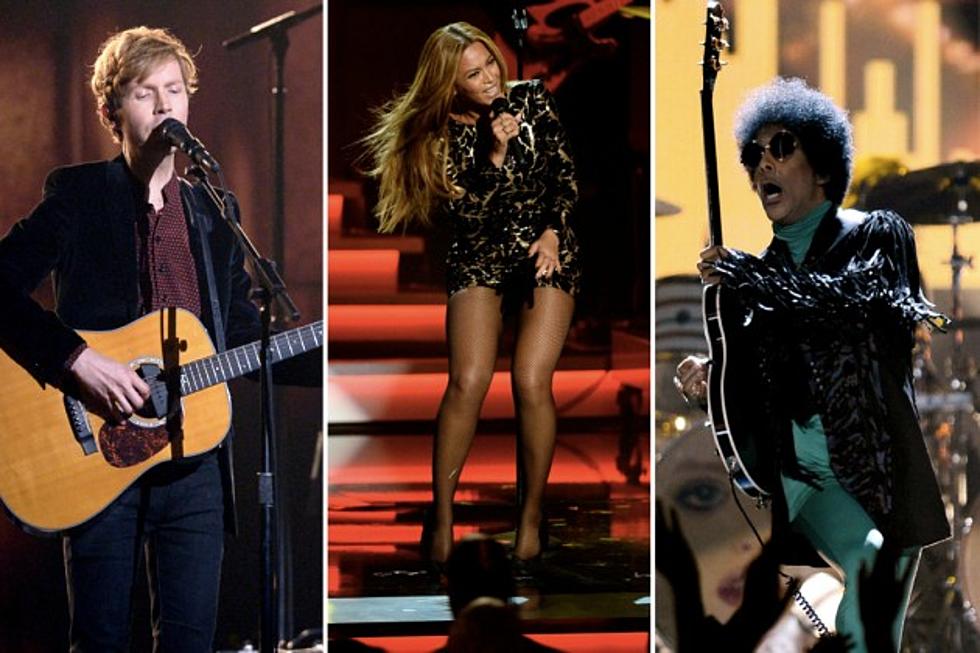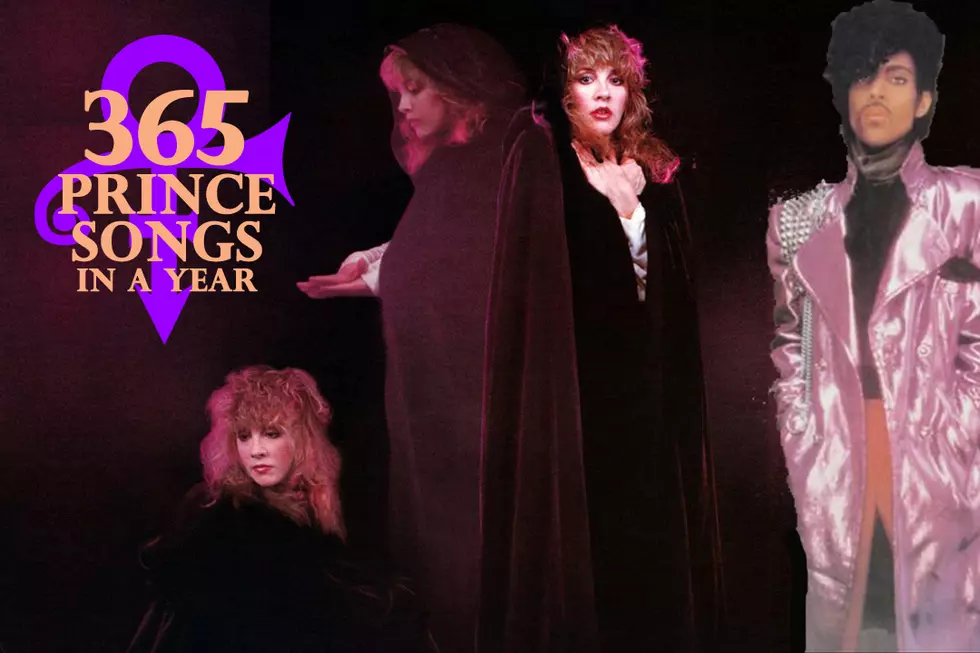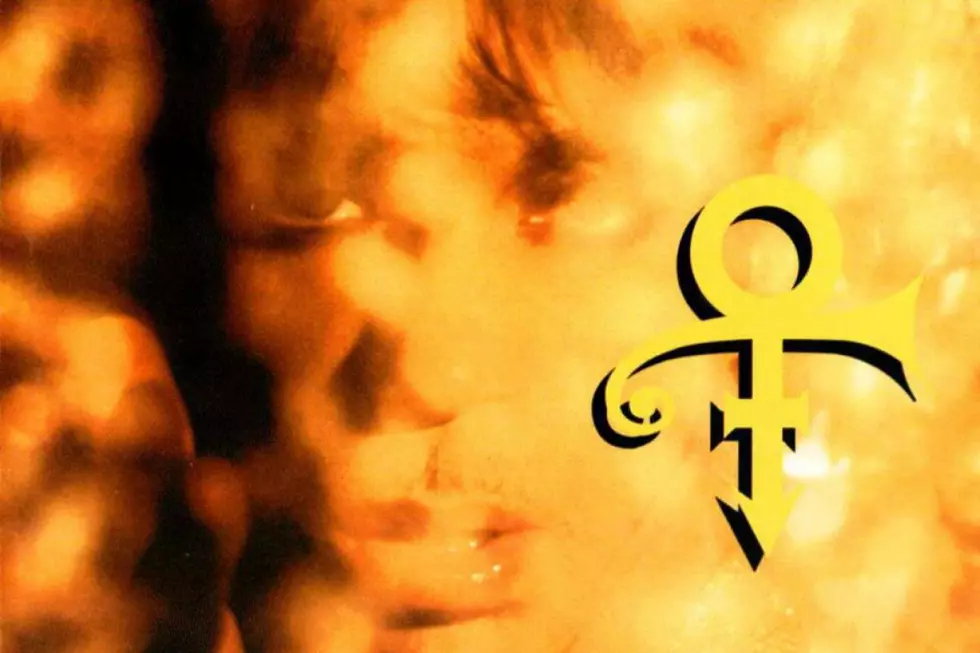
Musicians vs. Performers: The Endless Debate
Well, that was an interesting week.
In the wake of the 2014 Grammy Awards, and more specifically Kanye West's insistence that the Album of the Year winner "respect artistry," the longstanding debate over what is "good" has once again reared its ugly head. In this corner, weighing 98 pounds and fighting out of Los Angeles, introducing El Guero, Beck "The Loser" Hansen. And in the gold lamé corner, wearing the bedazzled trunks, stands Sasha Fierce.
Spoiler alert: These two aren't competing in the same match.
A popular meme floating round makes much of Beck's musicianship and songwriting skills. The same viral image denigrates Beyoncé as some sort of poseur who "needed 16 producers, songwriters and composers on her last album," also noting that she "plays zero instruments." There's some truth here, but those who circulate this unfair comparison are engaging in the same false equivalency that Kanye used to trigger last week's debate.
At the heart of the problem lies the fact that "the music industry" is an umbrella term for a diverse array of talented individuals.
At the heart of the problem lies the fact that "the music industry" is an umbrella term for a diverse array of talented individuals. Those who play instruments for a living are members of the music industry, as are songwriters, singers, producers, engineers, lighting riggers, roadies, guitar techs -- even the person who runs the board at your local club plays an essential role in the music industry.
Most of the people who drive the music industry work behind the scenes, and from a fan's point of view we don't really care about them. If they went away we certainly would, but their job is not to be noticed. All of those folks exist solely to make the person on stage or album look and sound good, and that brings us to the heart of the problem.
When we're talking about the people who transmit the music to us, varying degrees of distinction exist between musicians and performers. Some musicians make great performers and vice versa, but the two skill sets should not be confused.
Beck is a musician. He writes, plays, and sings his own music. These are his core competencies. He performs, too, but one doesn't go to a Beck gig for pyrotechnics and costume changes:
Beyoncé's core competency is performance. The lady has a voice, but her primary job is to deliver a spectacle:
Whether one of the above clips is good and the other bad is purely a function of what you as a consumer value. Those of us who gravitate toward the alt-indie end of the music industry spectrum tend to be suspicious of too much performance, as if all of the sequins and backup dancers are concealing some flaw or masking the emotional truth that we demand from our music. On the other hand, those who value spectacle find a scrawny dude in street clothes strumming a guitar a total waste of a night out.
Occasionally we get a unicorn: a musician and a performer. I dare anyone -- no matter your favorite musical genre -- not to leave a Prince concert in total awe both of the man's skill and his show. Just watch this clip from the 2004 Rock and Roll Hall of Fame concert. There's an immense amount of stand and strum musicianship on this stage, playing a song written and originally performed by one of the most tasteful guitarists of the rock era. It's a lovely black suit tribute to the recently departed George Harrison.
And then somewhere around the 3:30 mark, Prince kicks the whole thing up about 50 notches with a performance that's both exciting to watch and technically brilliant. Watch closely and you'll see Dhani Harrison, George's son, light up like a pinball machine while Prince tears up his father's song:
Whether musicianship or performance is the dominant product of the music industry is a cyclical thing. The '80s were the era of the hair metal bands, those guys with their hair piled high and Spandex suits that matched their lipstick. Some of those hair metal dudes were outstanding musicians who chose (or were forced) to play the hair metal game in order to sell records. Cinderella, for example, had more in common with '70s hard rockers like Aerosmith, but their musical heart was buried beneath their glittery performance:
The backlash from fans looking for something authentic was severe. Almost overnight the fabulous Sunset Strip shed itself of glamor in favor of cardigans, flannels, and Doc Martens. The serious musicians of the grunge '90s displaced the performers of the hair metal '80s, and a new music industry cycle began:
We tend to forget that grunge had codified rules for performance, just like hair metal did -- just like Beyoncé does. It had a costume, earnest poses and even more earnest stage patter. Eddie Vedder was no more free to scream "let's party" than David Lee Roth was to talk about the plight of the rain forest.
We also tend to forget how essential the performance component of the music industry is. When a band or artist gets to a certain size, arena tours are inevitable. It's a matter of simple economics: When 15,000 people in a town want to see you, you can play one arena show or 30 nights of club gigs. But arenas are huge things, purpose built for big events like basketball games, monster truck rallies, and ice skating cartoon characters.
How does a musician reach the cheap seats in the back row of the last balcony? Performance.
That brings us to the Black Keys, a band whose musicianship and songs I very much admire. Dan and Patrick could plug in tonight at your local bar and blow the place away. But they're too big for bars now, so people like me who want to see the Black Keys live sometimes have to settle for a nosebleed seat in a 15,000-seat arena. Two guys in jeans on a tiny stage a thousand feet away does not make for a compelling arena show. Before you think that's a shot at the Black Keys, though, note that Beyoncé couldn't scale down her extravaganza for a convincing gig at Al's Bar.
Respecting artistry means appreciating artists for what they do, not what you want them to do.
I guess the moral is this: Regardless of what it may mean to Kanye, "respecting artistry" means appreciating artists for what they do, not what you want them to do. The world is filled with uniquely talented individuals. We each have ample opportunity to find musicians, performers, and musician/performers who hit us were we live.
Also, never invite Prince to play at your party unless you're ready to get blown off the stage. That dude is a total unicorn.
More From Diffuser.fm









